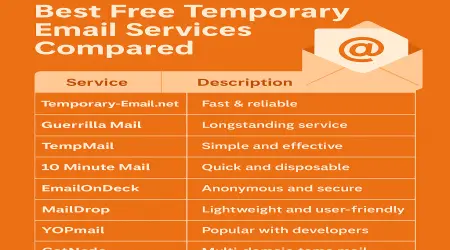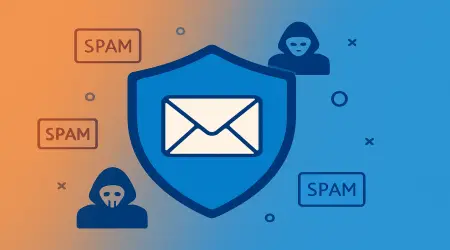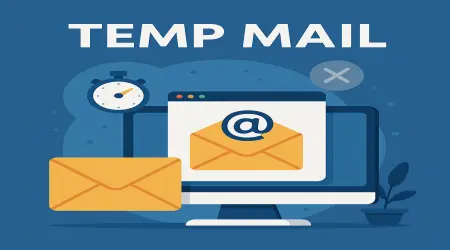

The Ultimate Guide to Protecting Your Inbox from Spam
The Ultimate Guide to Protecting Your Inbox from Spam (2025 Edition)
Introduction
Spam emails have been around since the early days of the internet, but in 2025, they’ve become more sophisticated and harder to detect. From phishing scams to aggressive marketing blasts, spam can overwhelm your inbox and put your privacy at risk.
In this guide, we’ll explore how to protect your inbox from spam, review the latest tools, and share smart strategies like using temporary email addresses and secure services such as Demail.
Why Spam is Still a Problem in 2025
Despite advanced spam filters, billions of spam emails are sent daily. Some bypass filters, others trick users with convincing designs, and many carry malicious links. Spam remains a top cybersecurity concern.
What is Spam Email?
Definition and Common Types
Spam is any unsolicited, irrelevant, or malicious email. Common types include:
Phishing scams (fake bank alerts)
Promotional spam (ads, discounts)
Malware attachments (ransomware, trojans)
Chain messages & scams
How Spam Affects Your Inbox and Productivity
Spam clutters inboxes, hides important messages, and wastes hours of productivity every week.
The Dangers of Spam Emails
Security Risks (Phishing, Malware, Scams)
Clicking spam links can lead to stolen data, hacked accounts, or malware infections.
Privacy Concerns (Data Harvesting)
Spammers often sell your data to third parties.
Wasted Time and Inbox Clutter
Deleting spam daily eats into your work efficiency.
How to Identify Spam Emails
Common Subject Line Tricks
Phrases like “Your account is at risk!” or “You’ve won a prize!” are red flags.
Suspicious Senders and Links
Fake domains and shortened URLs are common spam tactics.
Attachments and Urgent Language
Spam often pressures you with urgency and unsafe attachments.
Proven Strategies to Protect Your Inbox
1. Use Strong Spam Filters
Enable advanced filters in Gmail, Outlook, or business accounts.
2. Avoid Sharing Your Primary Email
Keep your main inbox private.
3. Use Disposable or Temporary Emails
Generate temp emails for one-time use, protecting your real inbox.
4. Create Separate Emails for Work and Personal Use
This separation reduces risks.
5. Regularly Unsubscribe from Unwanted Newsletters
Prune your subscriptions to keep inboxes clean.
Advanced Methods to Stop Spam
AI-Powered Email Protection Tools
Modern filters use AI to detect spam patterns.
Enabling Two-Factor Authentication
Even if spam steals your login, 2FA prevents access.
Using Secure Services Like Demail
Services like Demail provide encrypted, private inboxes designed for anti-spam security.
Temporary Email: A Smart Weapon Against Spam
How Temp Emails Block Spam Effectively
Instead of giving your real email to every website, use a temporary email that expires automatically.
When to Use Disposable Emails
Signing up for free trials
Downloading eBooks or freebies
Accessing public Wi-Fi
Best Temporary Email Providers in 2025
Some of the most trusted providers include:
Temporary-Email.net
10 Minute Mail
Guerrilla Mail
YOPmail
Spotlight: Demail and Privacy Protection
What is Demail?
Demail is a secure, disposable email service that provides encrypted and anonymous inboxes.
How to Create a Demail Account Easily
Follow this step-by-step guide to set up your own Demail in minutes.
Why Demail Helps Prevent Spam
Unlike regular temp mail, Demail offers end-to-end encryption and stronger privacy protections.
FAQs on Spam Protection
Q1: Is it safe to open spam emails?
No. Even opening can trigger tracking pixels.
Q2: Can I get hacked by clicking spam links?
Yes, phishing links often steal your login data.
Q3: How do spam filters work?
They analyze subject lines, sender reputation, and keywords.
Q4: Should I report spam emails?
Yes, reporting improves spam filters globally.
Q5: Do temporary emails completely stop spam?
They prevent spam from reaching your main inbox but won’t stop all scams.
Q6: What’s the safest free spam protection method?
Combining spam filters with temporary emails is the best defense.
Conclusion: Take Control of Your Inbox
Spam emails are annoying at best and dangerous at worst. By combining strong spam filters, temporary emails, and privacy-focused services like Demail, you can take control of your inbox and keep it secure in 2025.
Ready to level up your email security? Learn how to create a Demail account easily and start protecting your inbox today.

